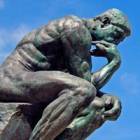04. Christian philosophy
Categories
-
Thomism in the xx Century
 1. Main characteristics of Neo-Scholasticism
We call "neo-scholasticism" that renewal movement of philosophy and theology held in the nineteenth and twentieth centuries. We must take the term neo-scholastic in a very wide sense because on one hand we can speak of a Muslim or Jewish [...]
1. Main characteristics of Neo-Scholasticism
We call "neo-scholasticism" that renewal movement of philosophy and theology held in the nineteenth and twentieth centuries. We must take the term neo-scholastic in a very wide sense because on one hand we can speak of a Muslim or Jewish [...]
09:00:00
-
Being, soul and body
 The unit of everyone as manifested in very different levels of unity. In the vital level, man is bound to life primarily through their bodies and physical abilities. The psychic level is defined by its "interiority", ie the area of emotion that is irreducible to the purely [...]
The unit of everyone as manifested in very different levels of unity. In the vital level, man is bound to life primarily through their bodies and physical abilities. The psychic level is defined by its "interiority", ie the area of emotion that is irreducible to the purely [...]
09:00:00
-
The soul
 In the intellectual, own level of human beings, this instinctive circuit is definitely broken as freely choose the means by which the living being is maintained in the world. Classical philosophy called soul to the vital principle is constituted as prime act of being alive and all its powers. Do [...]
In the intellectual, own level of human beings, this instinctive circuit is definitely broken as freely choose the means by which the living being is maintained in the world. Classical philosophy called soul to the vital principle is constituted as prime act of being alive and all its powers. Do [...]
07:32:00
-
Unity of the person
 The denial of the substantial unity of the person could claim from very different positions. It should be recalled, for example, the philosophies of Plato and Philo who admitted the existence of several souls, or psychological phenomenalism in which there is no substance that is identity support [...]
The denial of the substantial unity of the person could claim from very different positions. It should be recalled, for example, the philosophies of Plato and Philo who admitted the existence of several souls, or psychological phenomenalism in which there is no substance that is identity support [...]
09:00:00
-
The formal status of christian philosophy 4
 The Church has always sustained that the affirmation of faith doesn’t come from the intrinsic evidence of things.
As the I Vatican Council states: Due, precisely, to the common areas that arise at the confluence of subordinated sciences, there are common truths to both orders which [...]
The Church has always sustained that the affirmation of faith doesn’t come from the intrinsic evidence of things.
As the I Vatican Council states: Due, precisely, to the common areas that arise at the confluence of subordinated sciences, there are common truths to both orders which [...]
09:00:00
-
The formal status of christian philosophy 3
 The relation between the Christian theologian and revelation is different from that between the Christian philosopher and the objectivity of his speculative content. While the theologian reflects about the contents of faith by the inner coherence of the Christian misteries and his fidelity to [...]
The relation between the Christian theologian and revelation is different from that between the Christian philosopher and the objectivity of his speculative content. While the theologian reflects about the contents of faith by the inner coherence of the Christian misteries and his fidelity to [...]
09:00:00
-
The formal status of christian philosophy 2
 The first consequence of the meeting with Revelation is that the misteries of faith are not accepted for their intrinsic evidence but as a result of a free assent. While the greek attitude highlights the noetic aspect of intellectual adhesion, faith highlights the existential aspect in which [...]
The first consequence of the meeting with Revelation is that the misteries of faith are not accepted for their intrinsic evidence but as a result of a free assent. While the greek attitude highlights the noetic aspect of intellectual adhesion, faith highlights the existential aspect in which [...]
09:00:00
-
The formal status of christian philosopy
 A first distinction that must be taken into account when determining the formal status of christian philosophy is that existing between the wise character of every philosophy and the proposal of truth that Christian Revelation offers the believer. Aristotle, from an early age, had already [...]
A first distinction that must be taken into account when determining the formal status of christian philosophy is that existing between the wise character of every philosophy and the proposal of truth that Christian Revelation offers the believer. Aristotle, from an early age, had already [...]
09:00:00
Archive
::: May 2022
::: June 2018
::: November 2017
::: October 2017
::: September 2017
::: July 2017
::: June 2017
::: May 2017
::: April 2017
::: March 2017
::: February 2017
::: January 2017
::: December 2016
::: September 2016
::: May 2016
::: April 2016
::: March 2016
::: February 2016
::: January 2016
::: December 2015
::: November 2015
::: October 2015
::: September 2015
::: August 2015
::: July 2015
::: June 2015
::: May 2015
::: April 2015
::: March 2015
::: February 2015
::: January 2015
::: December 2014
::: November 2014
::: October 2014
::: September 2014





